DO-IT News November 2014

Volume 22, Number 4
Below are the articles of the DO-IT News November 2014 newsletter. These articles can also be seen all on one page at the Full Newsletter option.
Director's Digressions
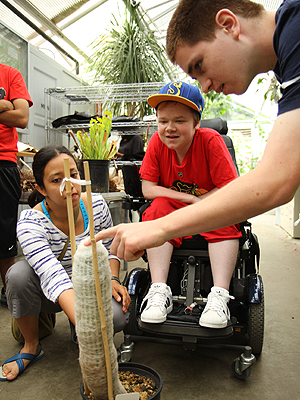
Forty-four DO-IT Scholars and Ambassadors participated in activities during the 22nd annual DO-IT Scholars Summer Study program in July at the University of Washington (UW). This program has helped launch the careers of hundreds of students with a wide range of disabilities. The participants also have fun and form friendships that will last for years to come.
Each year, I ask Phase I Scholars to share what they’ve learned in Summer Study. Their responses this year are summarized below:
- Disclosing your disability doesn’t keep people from wanting to be friends with you.
- I learned the importance of connections and networking.
- People with disabilities are like everyone else.
- I learned more about my specific disability, and about other kinds of disabilities—some I hadn’t even heard of.
- People with disabilities are not impaired; they just need to take a different path.
- Just because you have a disability doesn’t mean you have to be the odd man out; you can go to college and have a career.
- I learned how to use accessible technology, how to create a website, and how to keep my computer safe from viruses.
- I learned it’s okay to ask for help.
Summer Study: What Do Phase I Scholars Do?
DO‑IT Phase I Scholars participate in a two-week, live-in Summer Study session on the UW Seattle campus. They learn about college life; explore the Internet; interact with peers, staff, and mentors; and have fun. The DO‑IT Scholars program started in 1993 as an experimental project for teens with disabilities nationwide. It is currently open to Washington State teens and is supported by the State of Washington, the Boeing Company, the Microsoft Corporation, and the National Oceanic and Atmospheric Administration.
First Day Jitters
As we drive onto the amazingly beautiful University of Washington campus, the butterflies start coming. We think, what will the first day be like? What will the people be like? Will we get along with our dorm mates? Will the food be good? Will we be scared to ask new people about their disabilities?
In the dorm, the people at the front desk were super nice and helpful, taking us to our rooms and telling us how to unlock the door, how to use the food key, where to click your key to get into the hallway. After that, we grabbed our schedules and our bags and walked down the hill to Haggett Hall, where some of the parents were with DO-IT staff. We had introductions and a speech called “This is your life,” and then we went outside for dinner.
After dinner, the Interns held a panel where they told stories about their lives and how DO-IT helped them. They were in our shoes only a couple of years ago; it was inspiring to know we weren’t the only people who struggle. After the panel, we headed back up to our dorm for some evening activities and to unpack. Some of us went outside to play some sports, while others stayed inside to talk or play ping-pong. We had some amazing laughs and met some amazing people!
Card Games and People with Disabilities
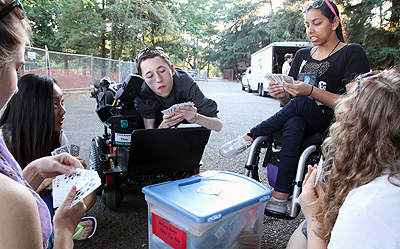
Playing card games can be entertaining for everybody. However, sometimes people with disabilities need to adapt the game to make it fully accessible.
We did some research by asking Scholars how they make themselves comfortable while playing cards. First, we talked to Alex. He has mild autism, which makes him hypersensitive to light and miss some social cues. Alex adapts by researching, so he’s prepared to play. The next Scholar we talked to is Thor, who has desmin myopathy. He needs a special type of wheelchair. He can play as long as the table is low enough for him to put his cards down. The last Scholar we talked to is Jason, who has low vision. In order for him to read or see his cards, he has to look at them up close.
Our research shows that adaptions can be made so that everyone feels comfortable playing cards.
Accessibility of the Seattle Aquarium
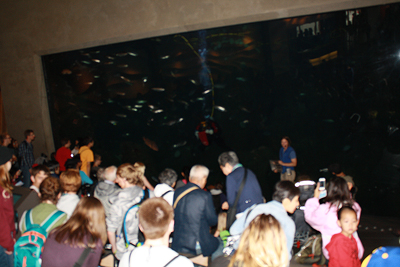
The Seattle Aquarium does not have too many accessibility issues for most disability types. Wheelchairs have access to most areas, but some exhibits have staircases, and big crowds make it hard to get around. This could also be a problem for visitors who need to stay close to an interpreter or staff member.
For people who are blind, someone would need to describe each of the animals in tanks or habitats. People who are deaf or hard of hearing may want an interpreter to understand what some of the staff are saying. People with dwarfism will have a hard time seeing some of the displays. Those with learning disabilities can also have a few problems. If heavy crowds are not an issue, most places in the aquarium are accessible.
What Do You Want to Eat?
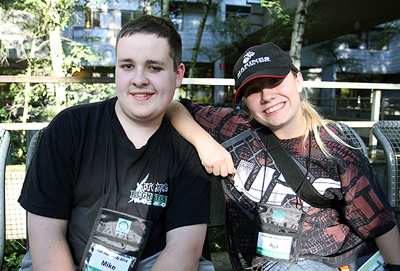
For most college students and DO-IT Scholars, the cafeteria is the place to be—for food and meal times, as well as socialization. It is an escape from the classroom, something everyone is grateful for now and then.
Life at college is full of new experiences, and the food is no exception. During Summer Study, DO-IT Scholars took their meals with everyone else—in the food court for lunch and at the cafeteria for breakfast and dinner.
The dining hall in McMahon offers a variety of choices. For every meal, there are options besides the main dish. Breakfast starts bright and early at 7 a.m. with scrambled eggs, fruit, pancakes, oatmeal, and other breakfast staples.
DO-IT Scholars ate lunch in the Husky Union Building (HUB) Food Court, which has several “restaurants” to choose from. We ate at DUB Street Burgers, which serves hot dogs, chicken strips, chili-cheese fries, and onion rings. DUB Street also serves breakfast sandwiches and burritos every weekday. We also enjoyed Firecracker, a Chinese restaurant, which offers crispy orange chicken, broccoli beef, and popular sides like eggrolls and veggie chow mein.
We didn’t get a chance to eat at Pastaria, which has made-to-order pastas, or Paggliacci, which makes pizza with local ingredients. But as you can see, the campus has a lot to offer. Whether it’s made by the chefs at McMahon or in the restaurants offered by the HUB, there’s always something good to eat.
Coming Together
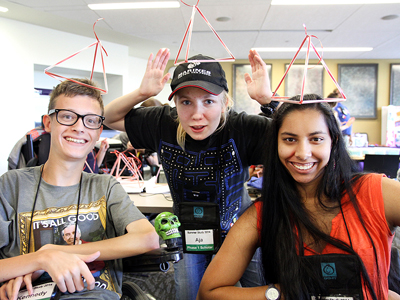
DO-IT is a place where kids with different types of disabilities come together for almost two weeks and learn about college life. All of us have often felt that we are different, but that’s not necessarily a bad thing. Upon first meeting, we made friends right away because we all had things in common.
Throughout Summer Study, it was fun and interesting to see how everyone coped with their differences. Our fellow Scholars were able to provide us with new ideas that could help us with our own disabilities, and we acquired a broader perspective on all of the different kinds of assistive technologies that are available.
We all came together and bonded without being reminded that we’re different, because at DO-IT, we all fit in.
Living in a College Dorm
We’ve learned a few things you should expect about dorm life, including living with a roommate, quiet hours, and using co-ed or shared bathrooms. All of these things can take some adjustment time.
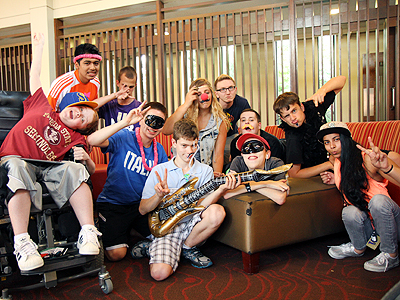
In a dorm, you will likely be assigned a roommate. It is important to be open-minded and have good communication skills. Even if you and your roommate are exact opposites, it can still be an enjoyable experience. The important thing to remember is that you’re not the only one that is going through this transition. Set up a plan with your roommate; for example, decide on separate spaces for each other’s things. That way each of you has an area to call your own.
In a college dorm there are designated quiet hours. It is important to respect these because people may be sleeping or studying, and hopefully people will extend the same courtesy to you when you need quiet time.
Many college dorms have shared bathrooms. They are sometimes co-ed, meaning males and females share the same bathrooms. These bathrooms can feel awkward at first. You don’t always know where to go, where to look, and where to do your business. One tip is to bring your clothes with you and change in the shower area. Another tip is to double check that there isn’t anyone in the stall you want to use (because nobody wants to experience that awkward moment). Just remember to respect people’s space, because not all of us feel comfortable with the same things.
Without Parent Supervision
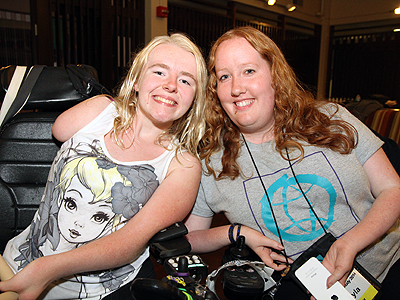
You learn a lot when you’re away from your parents. Summer Study taught us how to take responsibility, and helped us figure out what college life is like.
There is some adult supervision at Summer Study, for safety and to help us find things around the university. But for the most part, we took care of ourselves. We learned to keep important objects on us at all times, like our room keys. We also learned how to live with a roommate, and how important it is to communicate with the other person.
Without our parents to tell us to go to bed, we had to figure out how to get enough sleep to feel rested and get stuff done on time. We learned to be more independent.
Exploring Microsoft
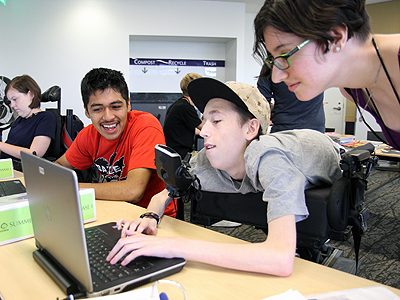
All of our field trips were cool, but this one really stood out. Microsoft’s presentation focused on audio, motion, and video technology, and they had a panel featuring employees with disabilities. With the Xbox Kinect and the Microsoft Phone, we had a glimpse into a future of interactivity that could change the world. With the disability panel, we got the idea that you can do anything you want regardless of what struggles you may face.
The Xbox Kinect is an add-on with the Xbox One, which tracks your motion and voice within a room. It can detect your hand, arm, and leg movements with surprisingly good accuracy. Using this technology, professional trainers can prescribe exercises using apps. The apps can tell you when you’re doing something right or wrong and measure accuracy. The results of your exercises can be sent to your trainer.
The camera shows a large amount of detail and has many different modes. One mode allows the image to be unaffected by light. There is also infrared mode, which shows body heat. The camera is commonly set up for game live streams, so the audience can see the players’ expressions.
Another interesting piece of technology is the Microsoft phone. A highlight is its voice commands. If you want it to tell you a joke, it will respond. If you ask it how the weather is in Seattle and then say “What about Hawaii?” it will recognize that you are still asking about the weather. Of course, it can still do the same things everyday phones can. If you don’t want to use voice commands, you can still do all the actions with your hands.
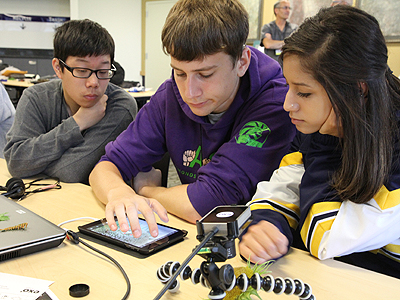
The panel included Microsoft employees with disabilities. One of the people on the panel was a quadriplegic, two of them had severely impaired vision, and one was deaf. They shared challenges they had to overcome, and that even though they have disabilities, they still lived their lives to the fullest and are successful employees at Microsoft.
We liked how we were able to learn about different things at Microsoft and that we could learn about it with people who know what it is like to have a disability. They helped us understand how we can do anything someone without a disability can do.
Going to Microsoft helped all of us learn that we can get jobs after college and get internships while in college. It built our confidence in what we can do after high school.
Favorite Hobbies of Scholars
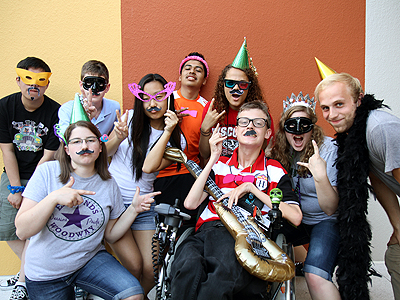
In a brief interview with our fellow Phase I Scholars, we asked what their favorite hobbies were. The responses included drawing, watching movies, swimming, hanging out with friends, hunting, watching TV, going to sporting events, and even cheerleading. However, the three most popular hobbies within our group were listening to music, reading books, and playing video games.
People have been listening to and composing songs since the invention of instruments, and music in all forms has been popular throughout history. Many of the Scholars enjoy listening to music of varying genres throughout the day and often can’t stop listening to especially catchy tunes. Some of the most popular genres liked by our Scholars include dance, pop, and rap.
Another popular hobby is playing video games. Video games are found almost anywhere nowadays such as in your smartphone, calculators, or even vending machines; they are not just limited to computers or consoles. Many students develop brand new games every single day with novel and interesting concepts that appeal to a small number of gamers, but sometimes they can explode in popularity if they are especially fun. Scholars, like many other teenagers, enjoy playing video games of different genres, including Flappy Bird, Mario Kart, and Halo.
Reading books is another classic pastime for both the young and old. There are brand new novels written every year. Sometimes an author’s very first book can be a hit, like Divergent by Veronica Roth, which was adapted into a movie released earlier this year.
In the end, whether it is turning pages to find out more about an exciting adventure, pressing buttons to blast another evil zombie, or bobbing to the beat of a wicked tune, there are many activities that our Scholars find very enjoyable.
Summer Study: What Do Phase II Scholars Do?
Phase II Scholars return to the UW Seattle campus for their second Summer Study. They meet the Phase I Scholars, learn about college life and career preparation, and participate in a one-week workshop with postsecondary instructors.
Neurobiology Labs
During the last week of Summer Study, we spent time in Dr. Marti Bosma’s Neurobiology lab and with Dr. Steph Bucks and Dr. Hiro Watari in the Neurobiology course labs. We learned a lot about key parts in sensory systems and about how substances affect the heart and brain.
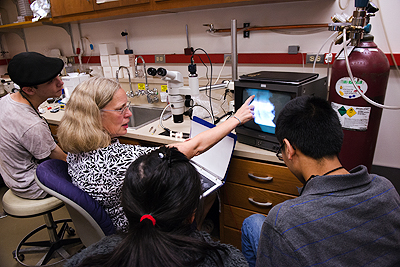
With the help of undergraduate researchers Jesse, Mitchell, and Michael in Dr. Marti Bosma’s lab, we learned about the effects of nicotine on the brain and heart of eleven-day-old mouse embryos. We started with the complicated process of dissecting teeny tiny embryos to reveal the still beating hearts and active brains. We then used a vast array of technology to administer and observe how different levels of nicotine changes the way the heart and brain function normally. This experiment helped us prove that smoking cigarettes has negative effects and will eventually destroy your heart and brain. Our experiments also showed us that a mother who smokes cigarettes can have an extremely catastrophic outcome for her unborn child.
We spent the rest of our time examining how the sensory systems of cockroaches work with the guidance of Dr. Steph Bucks and Dr. Hiro Watari. We started with attaching a cockroach leg to electrodes that measure sensory responses. We then measured the neuron signals we got from probing the leg spines on the electrodes. After doing this, we observed that the sensory systems of the cockroaches eventually adapted to the stimulus. This taught us how truly complex these creatures are in their ability to adapt to the environment around them.
Our Phase II Scholars, Rahil, Ryan, Clarissa, Alex, and Michael learned a lot and enjoyed every second of this opportunity. We want to give a special thanks to all the instructors for volunteering their time to teach us about their studies of neuroscience.
Reel Grrls
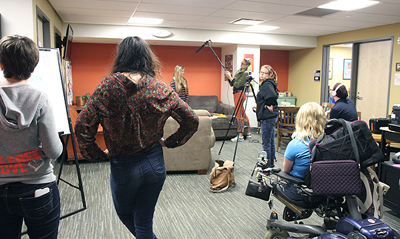
Ever get frustrated by people calling you inspirational or lazy for having a physical or learning disability? At Reel Grrls, we discussed disability and how it is portrayed in the media. We empathized with each other, talked about common ableist language, and learned the video production techniques necessary for getting our voices in the media. For our final project, we created two videos that pertain to disability and how the media portrays it.
More Information and Applying to the Scholars Program
To find out more information or apply to the Scholars program, visit www.washington.edu/doit/programs/do-it-scholars/overview.
Staff Profile: Hadi Rangin
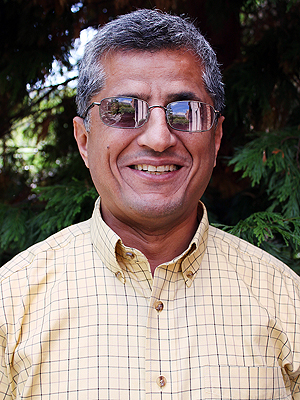
Hi, my name is Hadi Rangin, and I am the new information technology accessibility specialist for Accessible Technology Services (ATS), which includes the Accessibility Technology Center (ATC) and DO‑IT. My main focus in working with DO‑IT is to promote accessible design for students across the nation, and working with staff, developers, administration, and technology vendors to do so.
I am originally from Iran, but I moved to Germany in 1986. I studied computer science, with a focus on network management at Karlsruhe University. After I immigrated to the United States in 1994, I began to focus on human-computer interfaces at Oregon State University (OSU). I earned a master’s degree; part of my studies translated into accessibility issues.
I am blind, and this made a lot of my studies complicated since computer science is so math based, and math is still an area where we do not have great accessibility. But it also gave me a lot of passion to study harder and work through the accessibility problems.
While part of the OSU accessibility team, I met Sheryl Burgstahler, right after she had started DO-IT. After graduating, I began working for the University of Illinois in technology accessibility. Recently, I discovered a position opened at DO-IT, and I was eager to work with Sheryl, whom I have now known for over twenty years.
At the ATC, one of my main missions is to identify potential accessibility issues on campus and promote the creation of new software developed with universal design in mind from the ground up. This is a huge issue to tackle, since it takes so many people, new ideas, and a lot of time to tie together knowledge of the issues and expertise in technology design.
One of the main accessibility issues is the lack of computer programs that are completely accessible by keyboard. Designers so often leave out important functions in favor of the mouse, which just isn’t usable by a wide variety of people with physical or sensory disabilities. Another accessibility issue we have tried to tackle is the lack of structure in web products and programs. Users often have issues finding important information or even how to use these programs.
I rarely have free time, but when I do, I often talk with my wife and daughter, whom have not yet moved to Seattle. I used to often enjoy swimming and biking, which I hope to get back to whenever I have time.
AccessComputing Summer Internships
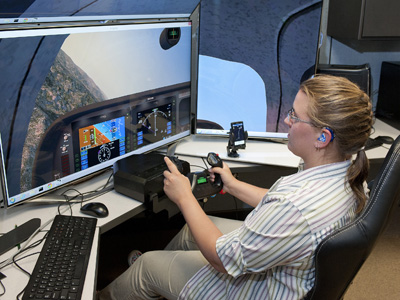
Summer is a busy time for our AccessComputing Student Team Members looking to learn more about computing careers and graduate studies. The AccessComputing Student Team is comprised of students with disabilities studying computing fields from across the country. This summer, about thirty Student Team members participated in internships, including eleven internships funded by AccessComputing. Six of these students are participating in Research Experiences for Undergraduates.
Internships are important because they prepare students for the next steps in their careers. Interns learn about career options and workplace accommodations and gain experience in their field of study. This summer, at least two AccessComputing Student Team Members began full-time employment with organizations at which they had interned: National Aeronautics and Space Administration (NASA) and Bank of America. We look forwarding to see more of our student participants leverage their internship experiences to employment in the future.
Computing students with disabilities interested in mentoring and other professional development opportunities can become a part of the AccessComputing Student Team by completing the online application at www.uw.edu/accesscomputing/get-involved/students/join-accesscomputing-team.
The Importance of User Feedback
Many people have a misconception about accessibility: that it’s an “optional extra”—as if people with disabilities were not in the same crowd as the average user or learner.
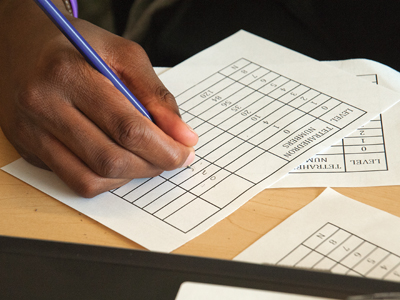
An accessible product doesn’t have to be extra; it could just be accessible for all from the very beginning. Universal design means a product is designed to be usable for all people instead of separate technologies for people with different disabilities. It is usually easier and cheaper to design a product and make it accessible from the very beginning, rather than add the accessible aspects retroactively. For example, a door that is originally wide enough for a wheelchair to enter has a much lower cost and installation time compared to widening the door after installation.
Many campuses and vendors are beginning to get the message about universal design, but we still have work to do. A lot can be accomplished by providing user feedback for inaccessible products. The more people who speak up, the more developers and vendors will hear, listen, and learn. Feedback can help developers make changes, fix bugs, and design their next product.
The default behavior shouldn’t be to turn your back on a technology if a developer doesn’t create a product correctly. It should be to help that developer create a better product.
The next time you experience accessibility problems with a website or web application, let your voice be heard. Be a part of the solution. Contact the responsible department or webmaster and let them know about the accessibility problems you are facing and volunteer to help them if they need it. It is also important that you follow up with them to ensure that they have fixed the issues. If you are still experiencing the same issues, you need to be persistent and politely complain again. It is equally important to let them know that the fixes they have been done have improved the accessibility of their site.
The Thread: Group Projects
I wanted to share with you a question posed by a DO-IT AccessSTEM Team Member in our Internet discussion forum and some of the responses so that you can get the flavor of the many rich conversations the DO-IT community has online. Featured responses are from DO-IT AccessSTEM Team Members and DO-IT Mentors, who are academics and professionals. Some forum posts are edited for clarity and brevity.
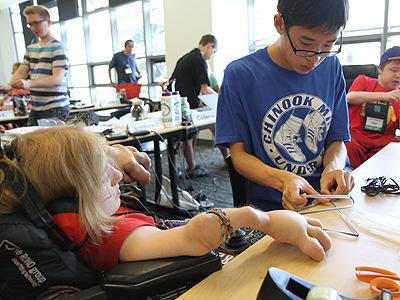
I am currently working with a team on a capstone project as a requirement for graduation. Throughout grad school I’ve had trouble working with teams, unable to effectively communicate that I can’t make all the meetings or why. Lately I’ve been having trouble managing symptoms of my disability. I’m exhausted, and I’ve been experiencing higher than usual pain levels. I need more down time in order to keep my body functioning, and I can’t take pain pills and muscle relaxers when I need to use my head. I’m not sure how to handle the reactions of my teammates when they have no clue as to how much effort it now takes me to just get through one day. They get visibly upset with me: dirty looks, not-so-nice tone of voice, talking down to me. One of them even keeps asking me, in a condescending manner, if I’m understanding, if I’m following along, do I get it... She doesn’t do that with other team members.
I have been pitching-in where I can by doing things such as taking on a great deal of the team’s writing deliverables; however, when we get a grade that is lower than expected, I also take the blame, even though the team had ample opportunity to contribute and provide feedback.
I wonder if you could share how you’ve handled group situations when you weren’t able to physically keep up with the rest of the group. How do I communicate this without appearing incompetent, unintelligent, and like I’m trying to get out of doing things? How do I respond when I am blamed for the result of a group effort? What are some unique ways in which I can contribute to the group effort? How do I turn a bad experience into a good one?
AccessSTEM Team Member: You should calmly and privately speak to the girl who keeps talking down to you, and explain to her that it’s offensive when she does—and that you’re not incompetent. Tell her you’ve been struggling with medical problems that you’ve had for a while, and that they make you exhausted. Ask for her understanding, not her pity. Try to have a conversation about your limitations and strengths, how you’ve been applying them to your activity in the group so far, and if she can think of something more you could do to satisfy the group. Try to get her to work with you on this.
I’d also say don’t tell her more than what you want everyone in the group to know. Because that’s usually how groups are, no secrets. If you tell her about your issues while asserting your competence, then maybe her judgment and that of the group will soften and you’ll be able to reach a compromise. You don’t want it to sound like they should pity you. That’s different. That takes away too much of your power and you might still be seen by her and the group as incompetent or “unsalvageable.” In the conversation you have, don’t say or do anything that sounds like you’re making excuses; your health struggles are just a fact of your life, not something you “chose” to happen to you.
AccessSTEM Team Member: First things first, you’ve got to a) address the disrespect, and b) admit you’re having difficulties. So how do you do that? Here are some suggestions:
Is she the group leader? If so, pull her aside to talk to her. If not, talk to the group leader, or the entire team. Firmly tell her that her tone is offensive, and she must stop treating you that way. Ask for respect. If you don’t ask, you won’t get it. Tell her you have a disability. No need to explain in detail. Say you have trouble keeping up with the schedule given your disability. Also tell her your strengths. Explain the ways you can better support the group project: Are you the better project manager? Would you better serve the team by handling all the scheduling and communication?
Talk to your professor today! Tell him the problems you’re experiencing in the group, and what steps you’re taking to address the situation. When all is said and done, you’ve demonstrated your ability to overcome workplace challenges, which is very valuable to most employers.
AccessSTEM Team Member: I’ve also had trouble meeting with people for a group project outside of the classroom. I have trouble seeing and reorganizing people in a place where I don’t usually see them. I wish professors were more understanding of the struggles group projects create for some people. I had to drop out of German because of all the trouble I had working with groups, though I really wanted to learn the language.
DO-IT Mentor: I support these recommendations, as well as the idea that you should reflect on your strengths and weaknesses. Are you contributing your biggest strengths? Is writing your area of strength? If yes, stay with it. If you have higher areas of strength, seek to contribute to the group project with that strength.
Call For Articles
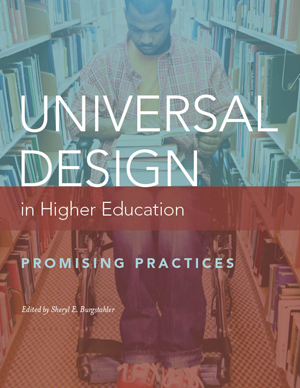
In DO-IT’s online publication, Universal Design in Higher Education: Promising Practices, practitioners share promising practices related to the application of universal design in postsecondary education settings. This collection of promising practices complements the more general content in the printed book, Universal Design in Higher Education: From Principles to Practice, published by Harvard Education Press (http://hepg.org/hep-home/books/universal-design-in-higher-education).
The new publication is available freely online at www.washington.edu/doit/resources/books/universal-design-higher-education-promising-practices. It can be freely copied and distributed as a book or in part for noncommercial, educational purposes. The collection will continue to grow as more articles are submitted.
Articles may be submitted at any time to udhecop@uw.edu. Submitted articles should include specific ways practitioners and researchers have applied universal design in postsecondary settings along with evidence of success. They are peer-reviewed by members of the Universal Design in Higher Education Community of Practice (udhecop@uw.edu), and if accepted, edited by DO‑IT. Articles selected for the online resource are freely available on our website. Authors must agree to these conditions while retaining copyrights to their individual contributions. For author guidelines, consult the preface of the book at www.washington.edu/doit/preface-0.
How can you DO-IT?
- Sign up to receive DO-IT News if this newsletter was not mailed directly to you.
- Volunteer as a Mentor or to help with one of our Summer Study programs.
- Pass this newsletter on to someone you know who can benefit from our programs.
- Donate money to support and extend DO-IT activities including sponsoring Scholars from states outside of Washington, special events, work-based learning experiences, participant attendant or travel costs, refreshments for program participants, and creation and distribution of educational videotapes and publications.
DO-IT today by completing the form below! You may also make a secure online credit card donation at the University of Washington Make a Gift page by selecting the "DO-IT Program Gift Fund" option.
___ Sign me up to receive copies of DO-IT News, a free program newsletter.
___ Send me more information about DO-IT volunteer opportunities.
___ I would like to make a donation (payable to the University of Washington, Federal ID#91-6001537) to support DO-IT operations.
___ I have enclosed a check for $____________
___ Please charge $____________ to my credit card.
___ VISA ___ Mastercard
Date _____________
Card Number __________________________ Expiration Date _____________
Card Holder Name ___________________________________________________
Signature _____________________________________________________
Address ____________________________________________________________
City __________________________ State _____________ Zip ____________
Phone: Home __________________________ Business ____________________
E-mail: ____________________________________________________________
Your gift is tax-deductible as specified in IRS regulations. Pursuant to RCW 19.09, the University of Washington is registered as a charitable organization with the Secretary of State, State of Washington. For more information, call the Office of the Secretary of State, 1-800-322-4483.
Mail to:
DO-IT
University of Washington
Box 354842
Seattle, WA 98195-4842
Thank you!
The Browser: Calendar of Events
For a schedule of conferences, visit www.washington.edu/doit/resources/events
About DO-IT
DO-IT (Disabilities, Opportunities, Internetworking, and Technology) serves to increase the successful participation of individuals with disabilities in challenging academic programs and careers, such as those in science, engineering, mathematics, and technology. Primary funding for DO-IT is provided by the National Science Foundation, the State of Washington, and the U.S. Department of Education.
For further information, to be placed on the DO-IT mailing list, or request this newsletter or other materials in an alternate format, contact:
DO-IT University of Washington
Box 354842
Seattle, WA 98195-4842
206-685-DOIT (3648) (voice/TTY)
888-972-DOIT (3648) (toll free voice/TTY)
509-328-9331 (voice/TTY) Spokane
206-221-4171 (fax)
Founder and Director: Sheryl Burgstahler, Ph.D.